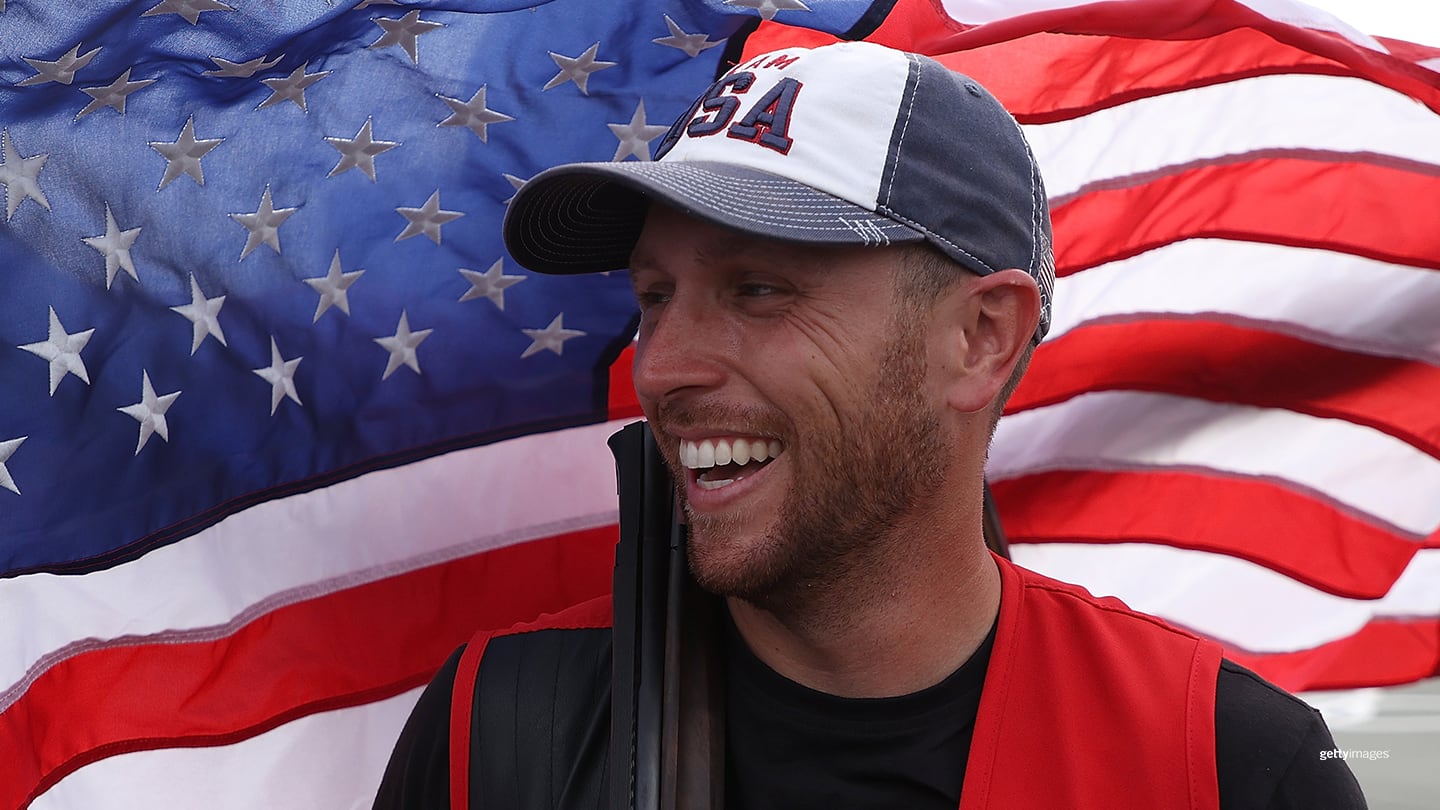
Army Support Helped Vincent Hancock Develop Into One Of The World’s Best Skeet Shooters
by Scott McDonald

Vincent Hancock poses following the men's skeet finals at the Olympic Games Tokyo 2020 on July 26, 2021 in Asaka, Saitama, Japan.
Pinecones and aluminum cans hardly stood a chance against a gun-toting toddler named Vincent Hancock nearly 30 years ago. The youngster spent hours popping away at inanimate objects with a BB gun near his northern Georgia home, but it was one day when he brought home a bird to his mom that he got his first real lesson about guns.
“I would see birds and think I can hunt like my dad,” Hancock recalled. “Then my parents taught me it was wrong. They taught me how to respect a gun, and my dad taught me gun safety.”
That scenario is a sketch of Hancock’s beginnings in becoming a U.S. Army veteran and one of the best shotgun skeet shooters in the world. His path from preschool led him to competitive shooting by age 10, joining the Army before his senior year of high school and eventually three Olympic gold medals and four world championships.
Hancock, 33, feels he has two more Olympics left in him before retiring.
With Veterans Day this weekend, Hancock recalled the sacrifices of not just his military brethren, but their families who also made sacrifices.
“Being in military, I want to thank people who are serving or who served in the past,” he told TeamUSA.org this week. “Thanks to all the military families, including my wife, who put up a lot with me being gone a lot.”
Hancock’s own journey really began when he started shooting shotguns just prior to his teenage years. By age 16 in 2005 he won his first world title, and that’s when the Army began aggressively recruiting him to be part of its U.S. Army Marksmanship Unit.
“I was competing against their best shooters at the time and winning,” Hancock said. “They said I could be part of the best team in the history of the United States.”
He attended basic training on June 1, 2006, just after his junior year at Gatewood High School in Eatonton, Georgia, concluded. He spent his entire summer before his senior in boot camp as a 17-year-old. He returned to school that fall in phenomenal shape and more mature than he could have fathomed.
There were 64 men in his unit — so many that they overflowed their barracks, requiring some to sleep in a storage closet, he said. The guy who slept in the bunk next to Hancock was 35-years-old. Boot camp was more than push-ups, running, obstacle courses, polishing boots and squaring away foot lockers. It was classroom time and learning the basics of the Army.
It was also a time to learn about different people from different cultures and different parts of the country. It was a time to learn that there was more to life outside of being a high school teenager.
“It was eye opening to say the least,” Hancock said. “At 17, we think we know a lot. We go through struggles. I felt a maturation process happen over that summer.”

(L-R) Amber English and Vincent Hancock during the medal ceremony for the men's and women's skeet finals at the Olympic Games Tokyo 2020 on July 26, 2021 in Asaka, Saitama, Japan.
When he returned to school, he saw his classmates in a completely different manner and focused on being a better student. The result was straight A’s during his senior year.
“When I saw how other kids acted and approached things, it was vastly different from how I had become,” he said. “There’s so much more to life than these few things you worry about at that age.”
Upon graduating from high school, Hancock was urged to delay his Advanced Individual Training (AIT) so he could compete in the first fall selection match to qualify for the Olympic Games Beijing 2008. Upon making those Olympics — and winning a gold medal in men’s skeet — Hancock completed AIT in December.
Most soldiers in the marksmanship program become infantrymen (B11) as their primary Military Occupational Specialty (MOS), he said. Hancock instead became an M88, which is a motor transport operator — truck drivers. He never drove a truck after his training.
Soldiers in the U.S. Army Marksmanship Unit must have a primary MOS like infantryman or truck driver because 00D (special duty assignment) is a secondary specialty.
Following those Beijing Games, Hancock remained at Fort Benning in Georgia during his 6 ½ years in the Army as either active duty or reserves. When he wasn’t shooting or instructing shooters, he was out marketing or recruiting around the country at events and various high schools.
At the Olympic Games London 2012, Hancock defended his gold medal in men’s skeet, becoming the first Olympic shooter to ever win the same event in back-to-back Games.
Four years later, he finished 15th at the Olympic Games Rio 2016, a time when he felt like he “was in a rut.”
“I had to figure out why we are doing this,” he said. “It’s something you have to put every ounce of effort into. I found this was my passion. It’s what I love to do. In the last five years or so, I try to find that joy in every competition, every practice session or every time I go to the gym.”
His renaissance led to a redemption gold medal at the Olympic Games Tokyo 2020.
He remembered lessons he learned in the Army and applied them to every aspect of his life, including competitive shooting and being the best father he can be to his two girls.
“No matter what you do, do your best. Not just in battlefield, but for your brothers around you,” Hancock said of his military training. “That set a standard for us to accomplish every day, physically, mentally and all aspects of everyday life.”
Hancock said he wants to compete in the Olympic Games Paris 2024 and ultimately make the Olympic Games Los Angeles 2028 his farewell on American soil.
“I’m getting close to retiring,” said Hancock, who’ll be 39 during the 2028 Games. “It’s more so because my kids are 10 and 12. I’ve been away for so long and, I want to spend as much time with them as possible. I don’t want to keep going just to compete for glory or gold medals. But I do want them to see I put every ounce of my body to show that I worked hard for them.”
Scott McDonald is a writer from Houston who has covered sports for various outlets since 1998. He is a freelance contributor to TeamUSA.org on behalf of Red Line Editorial, Inc.